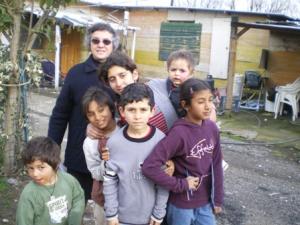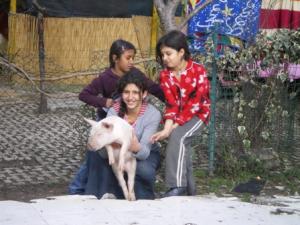|
INVISIBLE WOUNDS
Olga Sacoccio is an Italian sister and a member of the Holy Family. She has been working for years with refugees, immigrants and travelling people. She tells us about her work and how she experiences her mission

June 20 is a day for reflecting on and becoming more aware of the complex and difficult problems posed by immigration and political refugees. This is a global reality that is common to all countries and touches us all deeply. We cannot be indifferent to the suffering of so many young people especially women.
During the voyage, many people die as a result of violence, ill treatment, sickness and hunger. Women in an advanced stage of pregnancy arrive at the reception centres, exhausted and ill.
Young people who have lost everything desperately hope to find the work that they were promised but… what work? What house? What future? Sometimes they do not have the necessary documents, they can speak no other language but the language of their country and obviously this makes communication impossible. There are “cultural mediators” who are in contact with the consulates of the different countries. But waiting time for these services is long and the suffering and the feeling that they have no one to help them kills their hope and enthusiasm.
What can they do? When I became aware of all this, I began to work with organisations in Rome, in the Astalli Refugee Centre, run by the Jesuit Fathers. The aim of the centre is to welcome foreigners and offer them help and support. Above all the Centre aims to help people keep their dignity as free persons.
Groups of volunteers commit themselves to social work and health care in the centre. I form part of the local health service, offering first aid to the refugees especially to the women.
It is not easy to listen to the experiences of these people, to their personal tragedies and moral dilemmas. Months, even years will be needed before their hidden wounds are healed.
I have also been working for the past few years in a camp for travelling people. The camp is situated on the banks of the
Tiber about 4 kilometres from St. Peter’s. Again it is not easy to work with this group. It is difficult to enter into and to understand their culture. Every Saturday I go to the camp to listen to their problems and give them information about the social and health-care facilities that they can access in
Italy. I concern myself mainly with women and young people. Some young girls have been promised in marriage from the age of 12. The majority of them have no possibility of choosing their life partner. Sometimes they have only a day together to see whether or not they like each other and then afterwards the parents of the couple get together to draw up a marriage contract by which the woman becomes the property of her future husband and loses all contact with her original family. When the young girls have no dowry they are sent out to steal in order to make up for the money they should have brought to the marriage.
Huge work has to be done to help women to be active protagonists in the family and society. Some women have found work as gardeners in a co-operative; others sell things on the street and others collect used garments and repair them.
The travelling woman is a reference point for the whole clan. I meet up with the women and we work together to get the children integrated into schools and to access and make use of all the national public services available to them.
I have established real professional relationships with the travelling families and we have also created true bonds of friendship among us. Sometimes they invite me to their family celebrations and their traditional nomadic religious festivals. The simplicity of their relationships and the affection they show are a sign that they feel respected and loved even though they have a different lifestyle from the rest of society.
Sister Olga Sacoccio
Community of Montenevoso

|